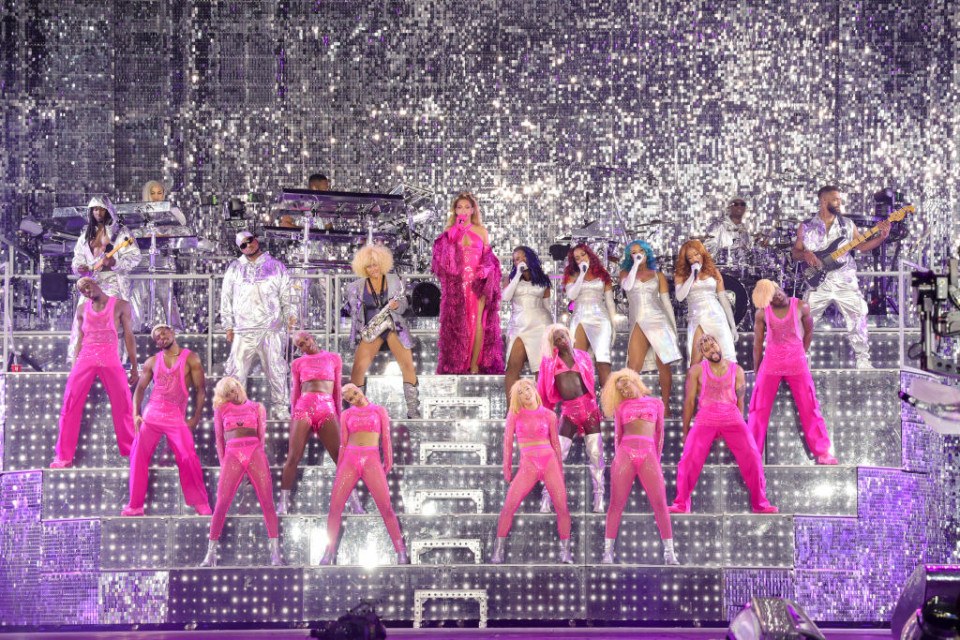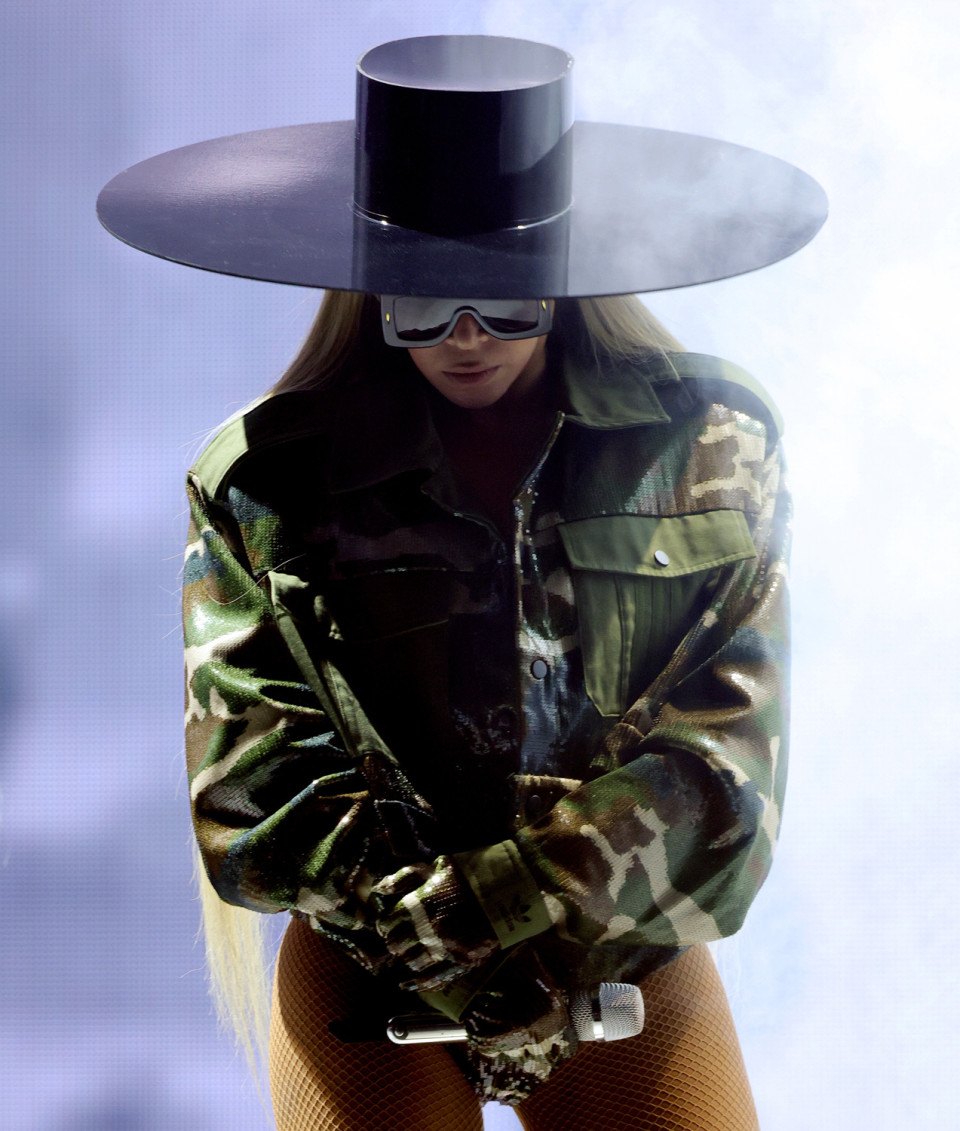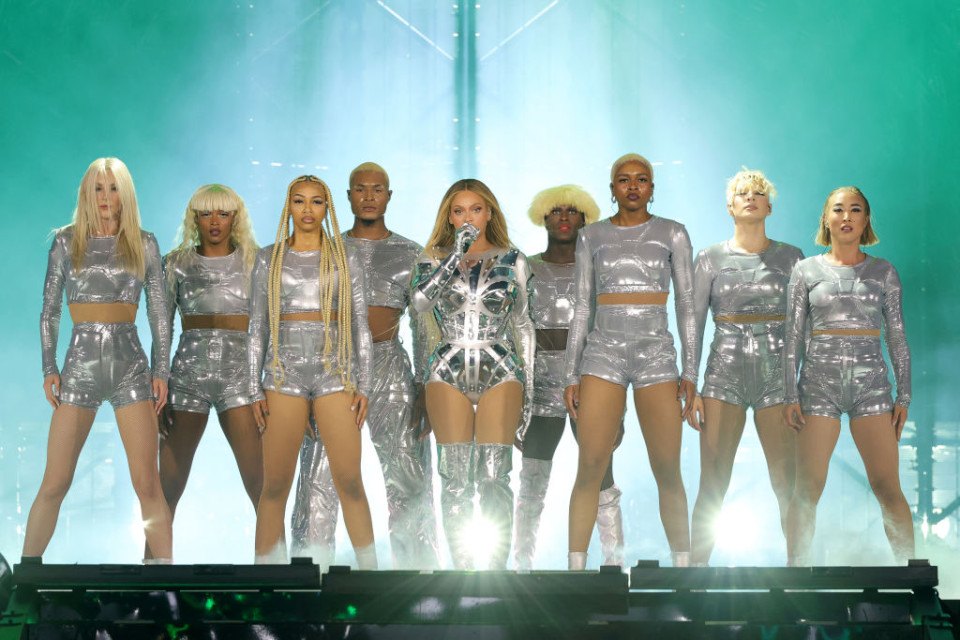Beyoncé’s Renaissance World Tour Is the Spiritual Revival America Needs Right Now
The superstar's nearly three-hour tour de force couldn't have arrived at a more urgent time when her Black and queer muses are under attack.

Beyoncé performs onstage during the Renaissance World Tour / Photograph by Kevin Mazur/WireImage for Parkwood
“America, America has a problem.”
Two weeks ago, when the U.S. Supreme Court struck down several laws that were intended to protect Black Americans and LGBTQIA individuals — Beyoncé was wrapping up the European leg of her highly anticipated Renaissance World Tour.
When the self-proclaimed Queen Bey returned to her homeland on Wednesday night, the timing couldn’t have been better. For a massive tour that was inspired by Black and queer artists who lived on the fringe of society — only the most consequential figure in modern music could provide refuge. Unlike many of her contemporaries, Beyoncé understands the power of her platform and how inescapably political it is.
For her to launch her pro-Black, pro-Queer, and pro-feminist U.S. tour date in the birthplace of democracy is as intentional as her dedicating her critically acclaimed album Renaissance to her late great Uncle Jonny — a Black queer man who passed away from HIV complications when she was younger. While other megastars drop Easter eggs on their fans for pure entertainment, Mrs. Knowles-Carter is more deliberate in tapping into the social consciousness of the challenging world her diverse fans still have to navigate.
Those who are white and conservative might consider her intentions propaganda. For a Black queer millennial like myself who has followed Beyoncé’s career my entire life, this is salvation.
I’m 31 years old, and I can’t ever recall when Beyoncé was not the soundtrack of my life. Growing up in Houston, Texas (her birthplace), my first Beyoncé concert was in 2004 when she performed at the Houston Livestock Show and Rodeo. I would later find out that I attended the same high school she (and powerhouse musician Lizzo) did — Alief Elsik High School. It was in that same school building that I danced to her hit single “Single Ladies” during a 2009 talent show competition (I would later do the iconic dance with my Man of Honor at my wedding in 2021).
So it came as a surprise to no one that my squad of Black queer friends and I got glammed up to see her in the City of Brotherly Love. Draped in mesh, sequins and leather — we were serving disco cowboy as we came ready to slay. We first attended Xfinity Live’s official Renaissance concert tour tailgate (better known as “BeyGate”) where nostalgia immediately kicked in as Beyoncé’s 25-year catalogue of hits shuffled in a room filled with fans from various backgrounds and generations.
By the time we hit our floor seats, it was clear that we were gearing up for an out-of-body experience. To maximize the moment, I did something that I’ve never done at a concert before: I turned off my phone and soaked in the memories. Philadelphia gave the reigning Queen of Music a royal sold-out welcome at Lincoln Financial Field as 67,000 screaming fans (more affectionately known as the BeyHive) rocked with her for nearly three hours.
Beyoncé was a musical impresario — singing her own contemporary hits then merging them into familiar classics. (She transitions her 2011 ballad “1+1” into a cover of Mary J. Blige’s “I’m Going Down” in the first act.) Her band is immaculate — taking us through the 1970s, ’80s, ’90s, ’00s and back again without losing the pulse of the audience. Her vocals are disciplined, effortless and powerful — she’s not just singing, she’s sangin’ with the mic actually on. With all that’s happened in the past few weeks, many of her past tracks took on a different meaning and proved to have aged remarkably well (her performances of “I Care” and “Flaws and All” felt notably more passionate).

Beyoncé’s Renaissance World Tour / Photograph by Kevin Mazur/WireImage for Parkwood
The show’s choreography was a masterclass. Beyoncé and her flawless dancers grooved through modern hip-hop, crump, break-dance, ballroom voguing, and had the crowd on its feet the entire night. Surprisingly, she didn’t lean on fan-favorites such as “Single Ladies,” “Drunk in Love,” and “Deja Vu” to achieve this feat. The woman has such a huge discography that you almost forget what she chose to cut for this tour.
But what will perhaps stay with me the most are the thematic elements that drove the entire show. Beyoncé explores Afrofuturism — taking her fans to a high-tech, melanated universe that’s not scary, but beautiful and liberating. A world where women in all shades, sizes, and orientations can be as sexual as they choose. A world where Black people are self-empowered and unapologetic about it. A world where LGBTQIA people can exist without fear — being as fat, femme, and free as they please.
In the most heartwarming moment of the show, Beyoncé’s 11-year-old daughter Blue Ivy Carter performed alongside her. Blue, already a Grammy winner, is impressively comfortable on stage and delivers choreography as fierce and imaginative as her mother. Moved by this family exchange, I had an epiphany about what Beyoncé was trying to achieve with this tour: She’s envisioned a world in which those whom she cares for so dearly (her family and fans) can be their best selves.

Beyoncé performs onstage during the Renaissance World Tour / Photograph by Kevin Mazur/WireImage for Parkwood
In those nearly three hours, it felt like the world was at peace. A crowd of thousands of singing fans weren’t idolizing a celebrity, but sharing safe space with diverse people connected by a powerful force called music. This wasn’t a concert; it was a spiritual revival for a demographic of individuals who needed to feel heard, seen, and felt. It was the best damn musical experience I’ve ever had in my three decades on this earth, and I doubt anything else will make me feel as inspired from a mainstream artist for quite some time.
At a time when it feels like the rest of America has a problem — the America I was in on Wednesday night at Lincoln Financial Field didn’t.


